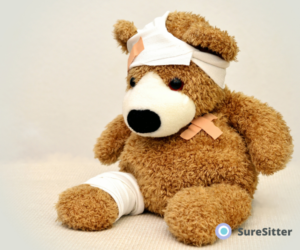Common Illnesses in Babies and Children!
What do new parents need to look out for with their new babies?
We were delighted to be joined by pharmacist Paula Reilly from Baxter’s Total Health Pharmacy to chat about some of the common illnesses in babies and children and how to look after them.
Becoming a new parent is a very exciting time, but can also be quite daunting. Whilst adapting to being a new parent you’ll encounter many moments of panic about your baby’s health. Some of the more common reasons to panic are fever, persistent crying or colic, constipation and teething. But all of these can easily be managed.
Fever
In children, any temperature of 38°C (100.4°F) or above is considered high and is classed as a fever. To find out if your child has a fever, there are a number of different thermometers that you can get in the pharmacy to measure your little ones temperature. If they have a temperature you can give paracetamol or ibuprofen to bring down the temperature. This is a really common illness or condition in children.
Colic
Colic is a common, but poorly understood, condition that affects babies. Colic is the term used when your otherwise healthy baby cries excessively and can’t be soothed. All babies cry, of course. But crying is excessive if it totals three hours a day and happens more than three days a week for at least three weeks. Colic is a very common condition that affects around 1 in 5 of babies. The symptoms of colic usually begin within the first few weeks of life, and usually resolve by the time the baby is four months of age, and by six months at the latest. The cause (or causes) of colic is unknown.
Colic is a self-limiting condition, which means that it resolves on its own after a few months. There are not many treatment options for colic, but there are a number of self-care tips that you may find useful for dealing with a colicky baby. These can include:
• Hold your baby close during a crying episode.
• Sit your baby upright during feeds.
• Gently rock your baby.
• A warm bath can really help some babies with colic.
• Avoid over-stimulating your baby with loud noise, bright lights or a crowded room.
• Gently massaging your baby’s tummy before they are likely to cry may help. Do this in a circular motion. Do not massage after a feed
Simeticone drops are a type of supplement that you can add to your baby’s bottle, or breast, milk before a feed. The drops are designed to help release bubbles of trapped air in your baby’s digestive system, so they may be of some use if symptoms of indigestion are contributing to their colic.
Constipation
Constipation in babies and children is quite common. If your baby drinks formula or eats solid food, they’ll probably have a regular bowel movement at least once a day. If your baby is breastfed, there’s no “normal” number or schedule. You need to watch out for less frequent bowel movements than usual and hard, dry stools that are difficult to pass – no matter how frequently.
There is some practical things you can try to help relieve the constipation which include baby massage or adding a little prune juice to formula or breast milk if your baby is at least 4 weeks old.
If your baby is old enough to eat a variety of solid foods, cut down on constipating foods like rice, bananas, and cooked carrots. Try giving her a few tablespoons of pureed prunes, apricots, or pears to help loosen her bowel movements.
Talk to your pharmacist about other treatment options. There is an over-the-counter stool softener to make it more comfortable for the baby to have a bowel movement. There are also glycerin suppositories if a baby is severely constipated.
Teething
Most babies start teething at around six months. However, all babies are different and the timing of teething varies. Some will start before they are four months old, and some after 12 months. Early teething should not cause a child any problems, unless it affects their feeding.
In the pharmacy you can get Teething rings which give the baby something to safely chew on, which may ease their discomfort and provide a distraction from any pain. One of the signs that a baby is teething is that they start to chew on their fingers, toys or other objects they get hold of. Try and give healthy things for a baby to chew, such as raw fruit and vegetables. For example, pieces of apple and carrot are often ideal. If your baby is in pain or has a raised temperature, some paracetamol or ibuprofen may be given, but always check with your pharmacist. Teething gels which contain a mild local aesthetic can help numb any pain or discomfort caused by teething.
You can find Paula and the team in Baxter’s Total Health Pharmacy in Longford or here on Facebook.





